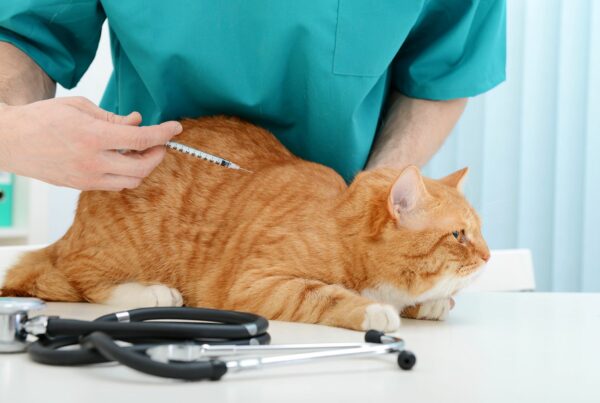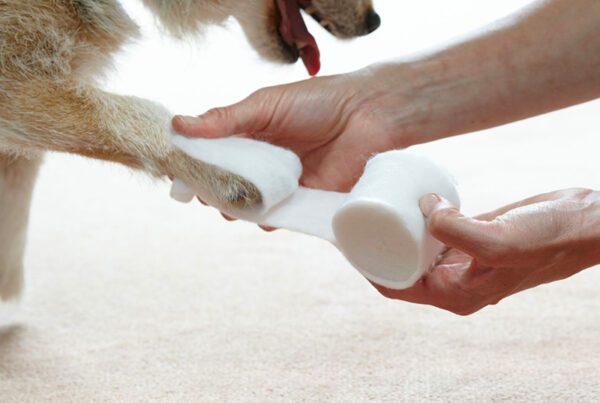Atopy is a hereditary skin disease of dogs, characterised by skin inflammation and itchiness (pruritus). Current understanding is that it is caused by an abnormal reaction of the immune system to tiny particles in the environment called allergens, combined with abnormalities in the surface layer (stratum corneum) of the skin. Allergens enter the body through the skin and lead to the production of certain antibodies in genetically predisposed animals. These antibodies then cause either intermittent or chronic (long-term) symptoms.
Signs and symptoms
- Itchiness is the main symptom of Atopy, demonstrated by scratching, excessive licking, chewing or rubbing of the affected parts of the body
- The most commonly affected areas are face, ears, paws, wrists (carpus) and ankle (hock) joints and the underside of the belly. Symptoms usually occur on more than one of these areas and are generally on both sides of the body
- Recurring or chronic ear infections (Otitis externa) are common
- Some dogs may also develop redness of the eyes, called conjunctivitis
- Initially the condition presents with red skin (erythema) and itchiness
- Over time, due to ongoing self-trauma, areas of hair loss (alopecia) can develop. The skin can become darker in colour (hyperpigmentation) and thickened with an irregular surface (lichenification)
- Secondary bacterial skin infection (pyoderma) commonly develops, which causes little red spots on the skin called papules. These fill with pus to form pustules, which then burst forming crusts and circular flaky areas
- Secondary overgrowth of yeasts and / or bacteria can cause the skin and coat to become greasy, which can cause a strong and unpleasant smell
Diagnosis
Unfortunately, Atopy cannot be diagnosed by any one single test. A diagnosis is usually reached by a combination of typical history and symptoms, with the exclusion of any other skin diseases which have similar signs.
This can take a number of visits to your vet, various tests and a series of trial treatments. This often requires considerable patience.
History
- Typically the first symptoms of Atopy will arise before the age of 3 years
- The most commonly affected breeds are Labrador and Golden Retrievers, English Setters, German Shepherd dogs, Boxers, Lhasa Apso’s, Poodles, West Highland White, Cairn, Fox and Jack Russell terriers but any other breed can also be affected
- Most cases of Atopy are seasonal or at least start off as seasonal
Symptoms
- The most commonly affected areas of the body are the face, ears, ear canals, feet, wrists and ankles, hocks and underbelly. Pruritus in its various forms is the main symptom
Ruling out other diseases, which may look like Atopy
By means of various diagnostic tests and the response or non-response to a variety of treatments a number of other skin diseases need to be ruled out. These are:
- Scabies or Sarcoptic mange a disease caused by mites usually contracted from foxes
- Harvest mites; small orange coloured mites which affect mainly paws but also face and underbelly
- Flea allergy dermatitis (FAD): More commonly affects the back half of the body but exceptions occur. Non detection of fleas does not rule out FAD
- Bacterial overgrowth or infection and yeast infection
- Food allergy or adverse food reactions: During the process of reaching a diagnosis of Atopy your dog may need to undergo a food trial lasting 6 weeks or more
- Irritant contact or allergic dermatitis: this is a rare condition and is caused by an allergic or irritant reaction to substances, which come into direct contact with the skin
Having ruled out all of the above conditions your vet will arrive at the diagnosis of Atopy. If this is the case, it may be deemed appropriate to determine exactly what your dog is allergic to. This can be done either by injecting small amounts of allergen into the skin, this is called Intra dermal testing (IDT) or by measuring antibody levels to various allergens in the blood, this is called Serology.
Treatment/prevention
- Allergen avoidance:
Taking measures to reduce exposure to the allergens, whether these are found indoors or outdoors may help reduce the levels of pruritus.
2. Hyposensitisation:
Having a vaccine made up, which contains the allergens your dog is allergic to and injecting this under the skin can be effective in 50 to 80% of cases. This is called Allergen Specific Immunotherapy (ASIT). It may take 3-12 months to see a positive response, needs to be given life long and is mainly used with young dogs suffering from symptoms throughout the year.
3. Treatment of “Flare factors”:
Effectively managing overgrowth of bacteria and or yeasts on the skin with antibiotics and/or antibacterial/antifungal shampoos is very important in managing Atopy. In some cases this may be the only form of treatment required.
4. Symptomatic treatment for pruritus:
A. Corticosteroids:
These usually come in tablet form or can be given by injection. They can be very useful in acute, short-term cases as they can work within hours, but must be used with care in more long-term cases in order to reduce the risk of side effects.
Corticosteroids can also be applied directly to affected skin in the form of gels or sprays. This form of treatment can play a very important part in managing Atopy
B. Cyclosporine:
This drug, like corticosteroids is very effective but costs significantly more. Although slightly slower to work, its advantage over corticosteroids is reduced long-term side effects.
Adding in other treatments, listed below, can reduce the dosage and frequency of administration of both corticosteroids and cyclosporine
C. Prescription diets:
These are specially formulated to improve skin health and reduce pruritus
D. Essential fatty acids:
These originate from fish and various plants such as Evening Primrose and Borage. It may take 8-10 weeks to see the effect of these
E. Antihistamines:
These may, in limited cases, have some beneficial effect
F. Topical treatments:
These are applied directly to the skin in the form of shampoos, lotions and moisturisers. They help soothe and repair damaged skin
Summary
Atopy is a life long skin disease, which has to be controlled rather than cured. However, good management can significantly reduce symptoms and dramatically improve the quality of life for your dog.
Researching a correct diagnosis is essential. This may require consulting a veterinary surgeon with extra expertise in skin diseases.
Treatment is usually life long and can involve significant commitment in terms of regular visits to your vet, expenses, and administration of various treatments.
Good control of flare factors such as overgrowth of bacteria and yeasts is a very important aspect of managing this condition.





